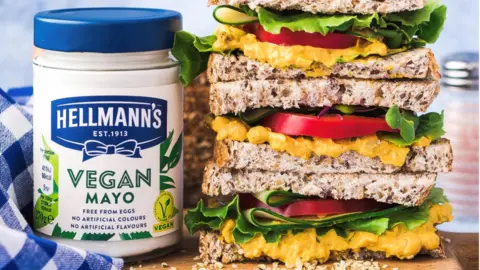UK giant Unilever bets on vegan food with 'scary target'
 Unilever
UnileverOne of the UK's biggest consumer goods firm is betting on more people eating vegan food and has set itself a "scary target" to increase sales.
Unilever wants to increase its annual sales of plant-based meat and dairy products five-fold within seven years, hitting €1bn (£900m) by 2027.
"It's a scary target, but it's important we set it," the firm said.
Consumers are increasingly turning to vegetarian foods for health and environmental reasons.
In the UK, there has been exponential growth in vegan food sales with sales of meat-free products in the UK up from £488m last year to £577m this year, according to analyst firm Kantar.
It doesn't necessarily mean people are becoming vegetarian, said Tesni Steele-Jones, consumer insight director at Kantar.
"Shoppers are looking for healthier alternatives and adopting a more flexitarian routine," she said.
"The most popular plant-based products are those that can be used when cooking from scratch or baking as people try their hand at new recipes while we are all spending more time at home."
'Scary' target
The EAT-Lancet Commission, a group of 37 scientists, reported this summer that eating more fruit and vegetables and fewer foods from animals gave health and environmental benefits.
Unilever said that the global plant-based meat market alone is estimated to be worth $35.4bn by 2027.
But the consumer goods giant will still have to pull out all the stops to reach its target.
"It will require really, really high growth rates," Hanneke Faber, president of Unilever's foods and refreshment business, said.
In 2019, Unilever's total sales were €52bn, with foodstuff sales of €19.3bn.
The company is betting on growing its plant-based meat brand The Vegetarian Butcher, which it acquired two years ago, and now sells in 30 countries.
It's through this brand that Unilever supplies Burger King's plant-based Whopper in 26 countries, with the fast-food chain having plans to sell its plant-based nuggets.
Unilever also wants to push its vegan dairy ranges, which include Vegan Ben & Jerry's ice cream, Magnum Vegan, Vegan Cornetto, and Hellmann's Vegan mayonnaise.
Price point
Plant-based mince from the Vegetarian Butcher is more expensive, pound-for-pound, than some premium beef mince products.
This could weigh on some price-conscious consumers minds, especially as the coronavirus crisis continues to affect the global economy.
However, Unilever is confident that by scaling up its plant-based food production it can bring prices down.
"Scale is going to make a difference over time," Ms Faber said, although it could be a few years before plant-based meat prices are comparable, she added.
Retailers are increasingly placing an emphasis on their vegetarian and vegan ranges.
In September, Tesco said it wanted to sell four times as much meat alternative protein by 2025 as part of a sustainability drive.
Green efforts
Along with its plant-based target, Unilever has also committed to halving food waste from factory to shelf by 2025, and to continue lowering calorie, salt and sugar levels in its products.
"It is widely recognised that the current global food system is inequitable and inefficient," said Ms Faber.
"One billion people around the world are hungry while two billion are obese or overweight. One third of all food produced is thrown away.
"And animal agriculture is the second largest contributor to greenhouse gas emissions after fossil fuels and a leading cause of deforestation, water and air pollution and biodiversity loss."
In September Unilever pledged to drop fossil fuels from its cleaning products by 2030 to reduce carbon emissions.
